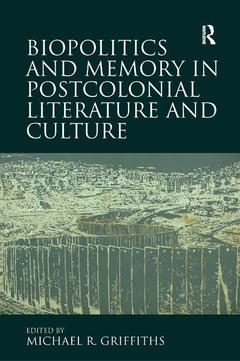Biopolitics and Memory in Postcolonial Literature and Culture
Auteur : Griffiths Michael R.

Date de parution : 01-2019
15.6x23.4 cm
Date de parution : 12-2015
15.6x23.4 cm
Thèmes de Biopolitics and Memory in Postcolonial Literature and... :
Mots-clés :
Colombo Plan Students; Ala Alazzeh; RAMSI Intervention; Anita Lacey; Anil’s Ghost; Asha Varadharajan; RAMSI; Bonnie Thomas; Californian Indigenous Peoples; Bruno Cornellier; Vice Versa; JosElipe Alvergue; Global Aid Regime; Maria Elena Indelicato; Solomon Islands; Michael K; Walonen; Bouchard Taylor Report; Nicholas Birns; Settler Common Sense; Rania Jawad; Bouchard Taylor Commission; RenIetrich; Settler Memory; Sandhya Shetty; Napoleon III; Timothy Neale; King’s Horseman; Timothy Wyman-Mccarthy; Darwish’s Poem; Cape York Peninsula; North Central Province; Miranda’s Father; Backdoor Entry; Galle Face Green; Young Man; Darwish’s Poetry; Act III; Settler Colonial Studies; Swan Book



